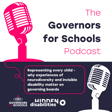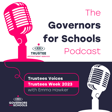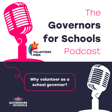Become a Creator today!Start creating today - Share your story with the world!
Start for free
00:00:00
00:00:01

How can governors address costs for parents and carers? - Interview with Kate Anstey, Child Poverty Action Group
The cost of living crisis is squeezing household budgets, making it harder for parents and carers to cover education costs such as uniforms, meals, learning materials, school trips, and more. In this episode, we chat to Kate Anstey, Project Lead on the Child Poverty Action Group's Cost of the School Day project, about what governors can do to support schools and families through tough economic times.
Find out more about the Child Poverty Action Group here: CPAG | Home
Catch up on our Counting the Cost campaign here: Counting the Cost - Governors for Schools
Transcript
Introduction & Campaign Overview
00:00:17
Speaker
Hello and welcome back to the Governors for Schools podcast. It's the second week of our Counting the Cost campaign, which means we're addressing a new theme affecting school communities. Last week, we looked at some of the ways the cost of living crisis is affecting building and estate management in schools, and how governors can help school leaders juggle rising energy costs and maintenance issues.
00:00:38
Speaker
This week, we're looking beyond the school gates to examine how the rising cost of living affects families struggling to cover their children's educational needs. From school uniforms and lunches to trips and educational experiences, the number of costs associated with sending a child to school can be overwhelming for low-income families.
Impact of Cost Crisis on Families & Schools
00:00:57
Speaker
So, what can schools and governors do to mitigate the impact of this growing crisis?
00:01:03
Speaker
To discuss this issue with me today is Kate Ansteady from Child Poverty Action Group, a child working at charity, working to understand the causes of poverty and how we can work towards meaningful and long-term solutions for children across the UK. Kate, welcome to the show and thank you for taking the time to join us today.
00:01:22
Speaker
Oh, thank you so much for having me on. I'm really looking forward to discussing this. Great. So just to start us off really, could you tell us a little bit more about yourself and what Child Poverty Action Group does? Absolutely. So Child Poverty Action Group works on behalf of the more than one in four children across the UK growing up in poverty.
00:01:43
Speaker
And as you said in your intro, we are researching and looking into the sort of causes and consequences of child poverty, and particularly in the work that I do through the Cost of the School Day project, which I'll talk a bit more about. And we're looking at what those costs and what child poverty kind of feels like for children and young people, particularly in the school environment. So I work or I head up a project called the Cost of the School Day that looks at
00:02:08
Speaker
I guess the financial barriers to education that children and young people face, how that feels, but also what can be done to remove some of those costs within the school environment. Yeah. So you mentioned that the cost of the school day project there, which I think has, you know, never been more vital now as the cost of living crisis is kind of ongoing. So could you just tell us a little bit more about some of the key issues the initiative kind of addresses?
00:02:35
Speaker
Sure. So first of all, I suppose it's useful to understand the scale of child poverty and what we're talking about here. So at the moment, according to the latest data, we have around eight children in a classroom of 30 live below the poverty line. And I'm sure lots of people listening to this will be aware that in lots of classrooms, it's much higher than that.
00:02:53
Speaker
Now what's happened in the last year or so with the cost of living crisis is that families with children have been particularly badly affected because of certain things that have you know certain things that risen in costs like food and energy families with children need more of that but also lots of the packages of support that have come out haven't really targeted children families with children so they've been kind of really badly hit by this current situation.
00:03:18
Speaker
And I suppose what we're seeing in schools is that those costs that are associated with school, it's becoming more and more difficult for families to meet
Research Insights on School Costs
00:03:28
Speaker
those costs. And I think I will say that school costs have always been an issue. This hasn't come around recently, but actually what we're hearing from families is that
00:03:37
Speaker
some of those parents who previously could manage some of those costs and are actually unable to meet them now and families are struggling more and more. And we're seeing it from the side of teachers and head teachers as well, seeing actually we're seeing in our classrooms, the impact of poverty and the impact of cost of living crisis affecting many more of our families than maybe they kind of previously saw. And also, I suppose maybe often it's more hidden
00:04:03
Speaker
And it's not necessarily obvious who those families are. So it's becoming sort of also kind of increasingly difficult for schools and with more families being affected. So in terms of, let's dig down a little bit into the cost that you mentioned. So what are the kind of the key costs that are affecting parents, carers and families, particularly when it comes to supporting young people's education? Yeah, so
00:04:25
Speaker
In terms of the research we carry out, we have spoken to around 12,000 pupils across the UK about school costs and over 2,000 parents and carers. And what has come through very strongly, particularly when we were sort of analysing the research in England in English schools, is that there were sort of four main areas that were causing or kind of common themes that were causing big challenges for families. So the first one of those, and some of these won't be surprising, but
00:04:51
Speaker
The first one is school uniform and material items, material possessions that children need for school. Now, when we've spoken to kids and families about this, it comes through that actually there are many school policies that exist, uniform policies that exist that place big requirements on families to have a long list of compulsory items, certain branded items, extra things like
00:05:20
Speaker
logos on shorts, etc. And all of these things kind of add up for families and mean that actually uniform is this really kind of huge cost.
Financial Burden & Stigma in School Systems
00:05:29
Speaker
And particularly if you have more than one child, it's kind of a huge financial outlay for families. So that's kind of number one in terms of big costs. The second one we hear a lot about is school food. And there are many, many issues around kind of the school food system. So everything from
00:05:47
Speaker
excuse me, from those families who are not eligible for free school meals feeling like the cost of food is too much. Children who are eligible for free school meals actually sometimes they've told us that their experience around school food can be stigmatising, it can make them feel different. Other things that we hear about is increasing amounts of dinner money debt.
00:06:08
Speaker
that families are facing and sort of problems around how that's dealt with in schools and we hear from children and young people about the portion sizes so I suppose school food is a really complex issue but it comes up and it has come up in every single school that we've worked in as being kind of a challenge for lower income families and because of those issues we see lots of children kind of missing out on food and not getting what they need at lunchtime.
00:06:30
Speaker
The third area that we hear a lot about is curriculum and learning. So what I mean by that is the kind of costs associated with subjects at school and learning and actually children are telling us that if you don't have money, it's very difficult to kind of fully participate in everything that school life has to offer.
00:06:47
Speaker
if you haven't bought the right calculator or you haven't got the right textbook or if you haven't got the sort of materials for art and design, then actually you can't take part in the way that everybody else can. And what we heard from particularly from secondary school pupils is that they were basing subject choices on the costs associated with those subjects. So actually they were avoiding things like music or food tech because they knew that it came with a cost. And I think you can kind of start to see how
00:07:14
Speaker
children's kind of path the ways through schools can be very affected by these costs that they're facing and the impact of that. I suppose the fourth challenge that we hear a lot about and we've summarized this as kind of school fun so all of those things that are part of school life that lots of children look forward to and bring a kind of sense of joy so things like the nativity play or
00:07:37
Speaker
charity days, fundraising days, your school fair, your book fairs, et cetera. These are all things that help to add enjoyment, extra enjoyment to school. But actually, if you don't have much money, then it's really, really difficult to look forward to those occasions and you can often really feel left out. There was one child just talking about even a cake sale saying that
00:07:57
Speaker
they couldn't afford a cake like their friends and one of their friends had to buy one for them. And it was that feeling of not feeling included in the school environment. So those four are the kind of key themes that have come through from schools in England. Yeah, it's so much when you kind of lay it out like that, isn't it? So this might be slightly more difficult to answer in terms of the cost of living crisis is fairly recent or it's sort of building in the fairly recent months.
00:08:27
Speaker
Can you speak a little bit about the ways in which the current crisis, acknowledging that it's been issues surrounding the cost of the school day have been ongoing for a while, but how the cost-living crisis affected the child poverty action groups work and how have things changed in the schools over the past year or so?
00:08:46
Speaker
Sure, yeah. I would say that I kind of mentioned we're hearing from families more and more that they're kind of struggling with these costs. Alongside that, we've been working with a coalition of organizations, unions, et cetera, who represent governors, head teachers, teachers, other school staff. And we've been kind of talking to them about what they're seeing in schools. And it's really clear from their perspective that the challenge is getting much worse in terms of that kind of
00:09:16
Speaker
deepening child poverty, seeing more of it in their school. I guess schools also having less capacity to sort of manage and less funding to kind of manage and support families. So it is a kind of challenge for everybody. It kind of affects every part of school life.
00:09:34
Speaker
And I think it just on very kind of practical, simple levels, you know, we've spoken to young people who've told us actually, we've seen the cost of our school food go up. You know, we used to be able to buy this much for this amount, and now we can't. So it's kind of playing out in lots of different ways. But I think
00:09:51
Speaker
The big problem or the big thing we're seeing is that as these costs become less manageable for families, this means children are less able to access their full education. And actually what the coalition that we've been working with is saying is that they're seeing children kind of falling behind on learning as a result of the sort of poverty that they're experiencing. So this is not something that should be ignored. This is a kind of huge thing that we do need to address and that like, yeah, the cost of living crisis is sort of contributing to those educational disparities.
Resources and Policy Solutions
00:10:22
Speaker
So in terms of kind of mitigating these disparities, what kind of support organisations or initiatives or grants can you kind of point parents, carers and schools towards for mitigating these school related costs? So the first thing I would say that's come through in our research is that often parents don't know exactly what support is on offer. So we'll speak to the school and they'll say we provide all these subsidies, but actually that information isn't necessarily getting through to parents. So
00:10:50
Speaker
I would say the first point of call is just make sure that you are speaking to your school and understanding what's on offer because they may be able to help with trips or uniform and you don't want to miss out on that support. I would also say it's really important for families to check whether they are eligible for free school meals. Again, we know there's quite a large percentage or there's a percentage of families who actually are missing out on free school meals because they're not aware that they're eligible for it.
00:11:15
Speaker
So again, you can speak to your school about this. They can help you to fill out a registration form or check your eligibility. And again, that's something that if you are eligible for free school meals, that can save families around 440 pounds a year. It makes a big difference.
00:11:30
Speaker
Another thing to be aware of for families and schools is that the new uniform bill has come in. So this is schools now have a kind of legal obligation from government to prioritize affordability in their uniform policies. And I think that is hopefully sort of being implemented and being rolled out in schools.
00:11:50
Speaker
parents, any parents who are listening to this, they really can sort of call, they can speak to their school about this and make sure their school understands that they have this legal obligation to bring down the costs. As I mentioned, the uniform costs are some of the biggest. In addition to that, in some local authorities, there are sort of local authority grants to support families with uniforms. So again, make sure you're checking your local authority website. They might also help with
00:12:17
Speaker
kind of trips as well. And then in addition to that, there's kind of, there'll be lots of kind of local charities and support around. So, you know, there's a number of charities out there that support with kind of school clothing and shoes, et cetera. So yeah, I'd say kind of look out for localised support, but yeah, those are some of the sort of big bits of help that are on offer.
00:12:37
Speaker
Yeah, it's helpful to kind of highlight those initiatives that are available to parents, but kind of on the school side, obviously to some extent the crisis operates like on this structural level that presents really significant challenges to schools looking to tackle kind of
00:12:54
Speaker
educational inequities. And having said this, are there any kind of simple policy changes schools can implement to minimise spending on, you know, all these various different expenses, schools, meals, trips, etc, that might present some kind of quick wins, I suppose? Yes, so I would really encourage schools that sort of if
00:13:15
Speaker
to go out and speak to families and children about the costs and sort of understand in their local context what's providing the most challenges for families. But there are definitely things that we would encourage all schools to think about and kind of check they're doing. So, you know, to start off thinking about uniform within the new guidance, it really encourages or suggests that every school should have pre-loved uniform
00:13:41
Speaker
or second-hand uniform provision on offer. So, you know, schools really, if they're not doing that already, they should be really thinking about how they can put that in place. And we actually developed a resource with the Children's Society and Children Northeast that really support schools with setting up that pre-loved provision in a really sort of dignified and compassionate way. So I'd recommend kind of looking out for those school uniform guides to help with that.
00:14:04
Speaker
On free school meals, I mentioned there are lots of families who aren't eligible but not currently registered, and so we would encourage schools to really think about their registration process. You know, are you making sure families are filling out a form when they first come to your school? There are kind of incentives around that that you can use.
00:14:23
Speaker
because again if you get family signed up to free school meals who are eligible that has a knock-on effect in terms of people premium funding and of course if you get sort of your full allocation of people premium funding you can use that to support things like breakfast clubs etc that are helpful for families as well.
00:14:40
Speaker
In terms of other things, we have, we've created a sort of calendar called the cost of school day calendar. And that goes through every month, month by month, all of the kind of pinch points or things that come up and might cause families problems. So everything from those, you know, your kind of Christmas jumper day or world book day or other sort of days in the year that might create a problem. And in that calendar, we've given lots of kind of alternative ideas and examples of what families can do. So just to give more examples,
00:15:08
Speaker
We know some schools on World Book Day rather than asking children to kind of dress up and bring in money, which can be a real challenge for families. We asked them to kind of, sorry, they're thinking about ways they can focus more on the reading. So we had one school that set up some bell tents in their playground and filled them with books and invited children and parents to come in and listen to people, sort of special guests reading. So it was really kind of putting the focus back on
00:15:35
Speaker
the purpose of the day rather than those elements of World Book Day that kind of sometimes can increase costs for families.
00:15:43
Speaker
Other things that you can think about is just making sure you're looking at your, like thoroughly at your curriculum and understanding where some of those costs might lie or where children are paying for resources and tools and just make sure that they're, you know, just think about how you can reduce some of those costs or offer subsidies. But yeah, I would say there are lots and lots of examples in our resources about things that schools are doing. We had another school who instead of a charity day did a kind of
00:16:11
Speaker
instead of a dress-up day. So we did like a kind of crazy hair day or odd sock day. Susan might seem like small things, but actually when you kind of piece it all together, they do make a big difference for the way that children feel about school and how much they feel included. And it also brings down the costs for families. Yeah, some great ideas there. And these resources are available on your website, aren't they? Yes. So if you go to the TPAG cost of the school day, and then there's a resources page where all of this is included.
00:16:39
Speaker
Great. So I guess quite a complex way that the cost of living crisis is really affecting children from low income households is related to kind of stigma surrounding poverty and social welfare. So how can schools and governors kind of work to minimise the potential for kind of stigmatising behaviour in schools?
00:16:59
Speaker
So one of the first things I would say is really important and this kind of came through in our project is about kind of staff awareness and understanding of poverty. We kind of spoke to schools before we started the project and actually they felt often they felt like they were doing all they could to support families and then through the process of working with us we've kind of uncovered more policies and practices that they could put in place. So I think
00:17:23
Speaker
School staff are really kind of good at knowing their cohort, their school, but actually school staff sort of attending training on poverty specifically just to really kind of
00:17:36
Speaker
ensure they understand kind of the scale of poverty, the impact it has on children and really practically what they can do about it in their school. So I'd say kind of accessing training, even especially kind of governors accessing that training as well, just to ensure there's not kind of a disconnect between what governors think is sort of happening in the school and the reality of it. So really sort of push that.
00:17:59
Speaker
Other things that schools can do around stigma, I think, is really thinking about the language and communication that they put out to families and children. So in all of the schools that we've worked with, we've actually sort of advised them or given them kind of templates around the types of language.
00:18:16
Speaker
they can use in any kind of correspondence with families just to make sure that that correspondence is really kind of compassionate and make sure that sort of anything on offer is universal and isn't just targeted at particular families using particular language that might put them off. So again I think that's something to really think about on the stigma front. And then I guess this sort of more broadly when schools are thinking about their policies and practices
00:18:41
Speaker
kind of looking at them through a poverty sensitive lens. So have you thought about how that might be experienced for a child facing poverty? And an example of this is how schools might administer free school meals, which I kind of touched on earlier, but I think lots of schools think they've kind of removed the stigma by having kind of cashless systems at lunch, but actually when you talk to children and young people, they can still...
00:19:03
Speaker
distinguish which of their peers are on free school meals and which aren't simply by things like those certain children aren't able to access the same menu or opportunity or food as others or at the kind of counter school staff or kitchen staff might kind of mention or you haven't
00:19:20
Speaker
if you haven't got enough money for that, your allocation doesn't stretch that far, your preschool meals allocation. So there are kind of these little ways in which children and young people pick up on things. So I think it's for the school to really kind of understand and think about their policies and practices from that lens.
Role of Schools and Governors in Support
00:19:37
Speaker
And as I said, kind of talk to children and young people and parents about their experiences.
00:19:42
Speaker
But yeah, as I say, also again, lots more examples in our resources are kind of particularly I think around the stuff I was saying on school fun. That is where we see a lot of kind of stigma and feeling not included in things. I think that's a particular area where schools are like looking into those resources might be able to pick up on some ways they can change those practices.
00:20:03
Speaker
Yeah great, that's all really helpful. So just to kind of wrap up the final question, are there any questions you would kind of encourage governors to raise during board meetings to ensure schools are doing everything they can to support pupils from lower-income households?
00:20:21
Speaker
Yeah, there are lots of questions, I think. And actually, I would say at the beginning of this, we've devised a toolkit with the National Governance Association that is on their website, sort of a toolkit on poverty. And it includes lots of kind of questions for governors to have a think about and to ask their boards. But I suppose a couple of kind of headline ones might be for the board to really question whether they kind of know exactly how much it costs for families to fully participate in school life.
00:20:51
Speaker
kind of looked across the whole of the school experience and kind of carried out that exercise of understanding kind of what costs money at our school, what are families paying for and having done that exercise I suppose do they believe that that's affordable, is it accessible, can they sort of check that with families and if not where are the areas where you could bring those costs down significantly. So I think
00:21:13
Speaker
The first thing is kind of getting a picture of what your school actually costs and working from there. Another thing is just really monitoring the data and asking those questions. Are we collecting data on which students are taking part in what activities? So, for example, if you're running after school clubs and breakfast clubs, are there particular children that time and time again aren't accessing those? And might it be that kind of cost is a barrier to them?
00:21:39
Speaker
monitoring data is really important. I've touched on this a few times, but do you have in your school opportunities for parents and pupils to feed in around school costs? Do you have those opportunities for dialogue to understand this issue?
00:21:54
Speaker
And then a couple of other things just to note, I would say like does your school have a nominated person that parents can come and speak to if they are having a challenge around costs? One of the things that came through in the research is actually that parents feel very reluctant or nervous about sharing information or disclosing financial information with their schools. So how are you kind of setting your school up in a way that it's really easy for families to come and speak to somebody
00:22:20
Speaker
if they are struggling. So those are a few things, but as I say, if you head to that toolkit on the NGA website, that gives a lot more sort of questions to work through around this topic.
00:22:31
Speaker
Yeah, great. We'll put the link to that in the show notes so people can access it, as well as the Child Poverty Action Group website. Are there any other kind of resources or channels through which people can find you? So in terms of other resources, we produced a really helpful toolkit with the National Education Union and Children Northeast called Turning the Page on Poverty. And I would say that's a really useful
00:22:57
Speaker
kind of starting point for schools and governors who are kind of beginning their journey on this and wanting to understand a bit more about the data, but also a bit more about what they can do, what questions they should be asking. So that's another one to kind of look out for. And yeah, we will be continuing as Child Poverty Action Group will be continuing to kind of
00:23:17
Speaker
research and talk to children and young people and families about their experience of school and kind of understand how the picture is changing and what that might mean for families. So yeah, I would say kind of keep an eye on us and we are also on Twitter, at CPAG, UK, but I would check that. Yeah, there'll be lots of information there about kind of briefings and things that we're putting out as well.
00:23:43
Speaker
Great. Fab, we'll put the handle in the show notes too. So yeah, thanks so much for taking the time to chat with me today, Kate. We really appreciate your insights and I'm sure listeners will find all of this really useful, whether or not they're governors.
00:23:57
Speaker
So I think what I would say is a final piece is there is, of course, it's not on schools to kind of resolve or eradicate child poverty. That is for governments to work on. But there is so much, our work has shown there is so much that can be done within the school setting to mitigate some of the effects and bring down those costs and kind of take pressures off families. So yeah, anyone in their classroom can make a difference to children and young people's lives.
00:24:24
Speaker
Yeah, indeed. I think that's a really good note to end on. So I'll just finish up by, first of all, extending our thanks to Alan and Ovry for generously sponsoring our campaign and making podcasts like this possible. To discover more about countering the cost, please visit our website at governorsforschools.org.uk
00:24:45
Speaker
head to our campaign webpage. There you can catch up on our latest resources which we'll be releasing throughout the campaign and please do remember to subscribe to our podcast and share our campaign materials with your friends and colleagues. So bye for now and tune in next week when we'll be chatting about people development and enrichment during the cost of living crisis.












